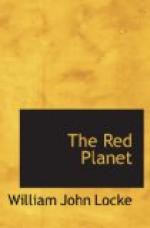As an ordinary soldierman, trained in the elementary virtues of plain-speaking and direct dealing, love of country and the sacredness of duty, I have had no use for the metaphysician. I haven’t the remotest notion what his jargon means. From Aristotle to William James, I have dipped into quite a lot of them— Descartes, Berkeley, Kant, Schopenhauer (the thrice besotted Teutonic ass who said that women weren’t beautiful), for I hate to be thought an ignorant duffer—and I have never come across in them anything worth knowing, thinking, or doing that I was not taught at my mother’s knee. And as for her, dear, simple soul, if you had asked her what was the Categorical Imperative (having explained beforehand the meaning of the words), she would have said, “The Sermon on the Mount.”
Of course, please regard this as a criticism not of the metaphysicians and the philosophers, but of myself. All these great thinkers have their niches in the Temple of Fame, and I’m quite aware that the consensus of human judgment does not immortalise even such an ass as Schopenhauer, without sufficient reason. All I want to convey to you is that I am only a plain, ordinary God-fearing, law-abiding Englishman, and that when young Randall Holmes brought down from Oxford all sorts of highfalutin theories about everything, not only in God’s Universe, but in the super-Universe that wasn’t God’s, and of every one of which he was cocksure, I found my homely self very considerably out of it.
Then—young Randall was a poet. He had won the Newdigate. The subject was Andrea del Sarto, one of my favourite painters—il pittore senza errore—and his prize poem—it had, of course, to be academic in form—was excellent. It said just the things about him which Browning somehow missed, and which I had always been impotently wanting to say. And a year or so afterwards—when I praised his poem—he would shrink in a more than deprecating attitude: I might just as well have extolled him for seducing the wife of his dearest friend. His later poems, of which he was immodestly proud—“Sensations Captured on the Wing,” he defined them—left me cold and unsympathetic. So, for these reasons, the boy and I had drifted apart. Until I had caught him in flagrante delicto of walking with his arm round the waist of pretty Phyllis Gedge, I had not seen him to speak to for a couple of months.
He came, however, after dinner, looking very sleek and handsome and intellectual, and wearing a velvet dinner jacket which I did not like. After we had gossiped awhile:—




